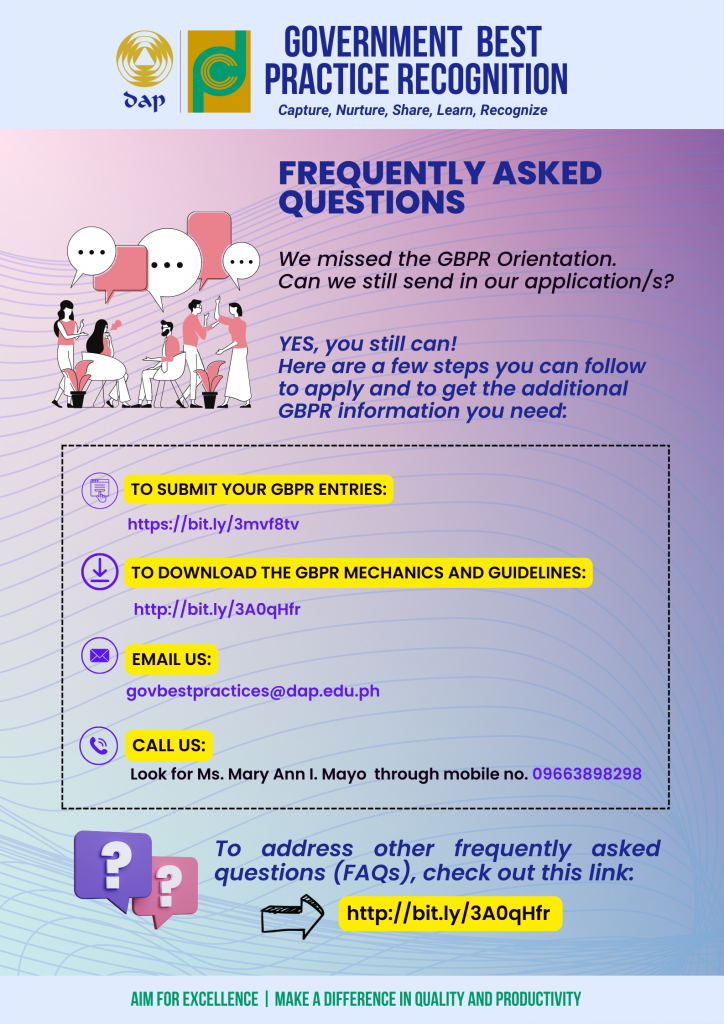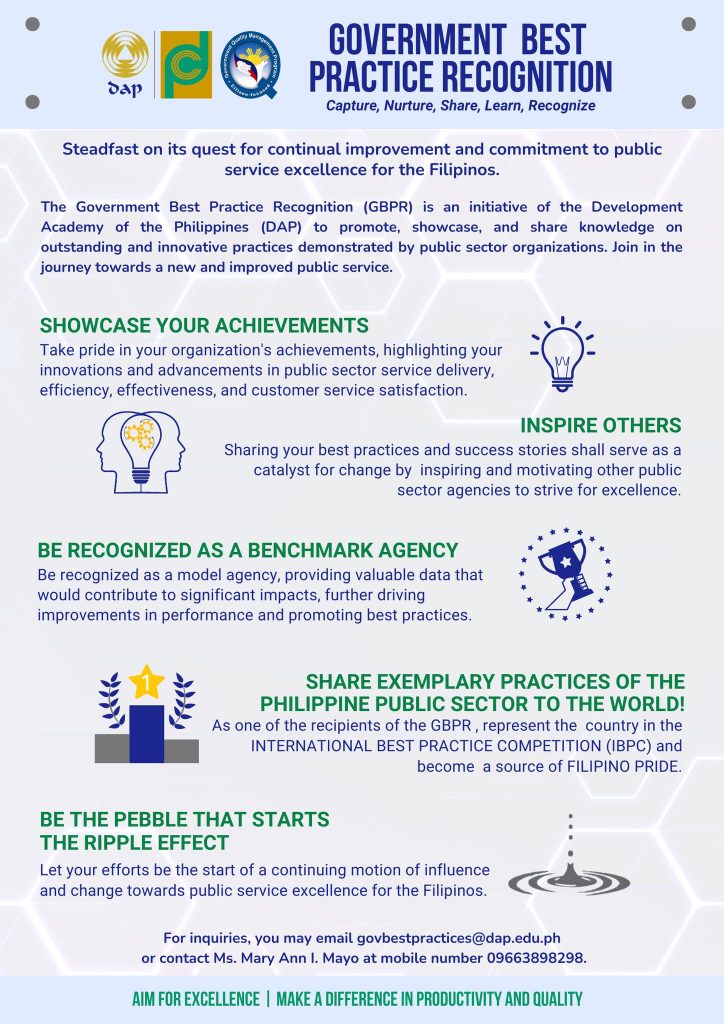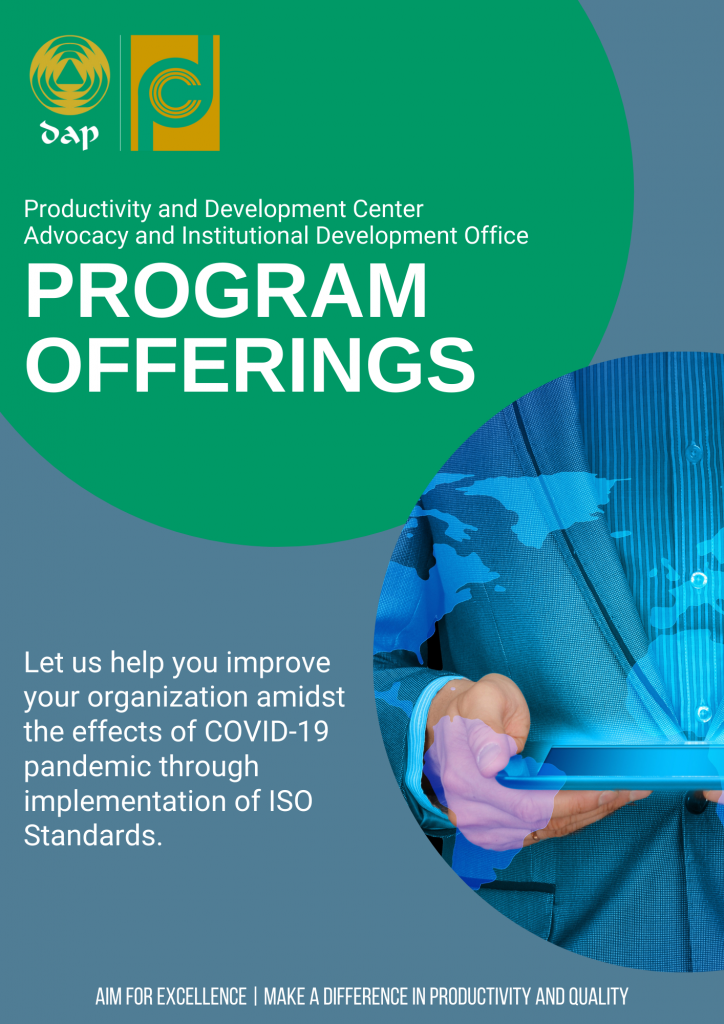The Productivity Development Research Office (PDRO) undertakes broad-based studies to address productivity gaps throughout the Agro-industry value chain. This includes studies on policies, regulations, and issues as well evaluations of programs and projects aimed at generating information for policy decision making and provision of necessary interventions to realize the implementation of study findings.
As a research unit its aims to: a) provide relevant, useful and up-to-date information on productivity to national and local policy-makers, businesses and researchers; b) recommend policy and resources support for implementation of specific productivity agenda; and, c) develop new approaches in addressing needs of priority sectors as results of quality, productivity and competitiveness studies conducted for more appropriate, comprehensive and effective interventions.
To effect productivity improvement in the agriculture sector, PDRO also embarks on the provision of technical assistance as its development function to help increase adoption of current and new approaches for enhancing productivity and competitiveness in agriculture and to develop the capabilities of key stakeholders in implementing P&Q technologies in the agriculture sector.
Products and Services
Concrete actions can be better designed with evidence on hand as basis. Deeper insights into contexts of issues and challenges can be captured through the conduct of research. Thus, the PDRO implements various research studies such as:
- Benchmarking Research
- Customer Satisfaction Survey
- Evaluation Study
- Feasibility Study
- Value Chain Analysis
- Policy Research
Moreover, the PDRO undertakes various projects in collaboration with the Asian Productivity Organization (APO) and the Government Quality Management Committee in the areas of advocacy and technical assistance for the development of a Quality Management System Certifiable to the International Organization for Standardization (ISO), institutionalization of Service Quality Standards (SQS) in frontline government agencies and offices, among others.

2020 CLIENTS
| # | CLIENT NAME | Type of Project |
| 1 | Philippine Council for Agriculture and Fisheries (PCAF) | Research |
| 2 | Department of Science and Technology | Research |
| 3 | Philippine Council for Agriculture and Fisheries (PCAF) | Research |
| 4 | Asian Productivity Organization | various |
| 5 | Department of Budget Management (GAA Funded) | various |
2020 PROJECTS
| # | PROJECT TITLE | Brief Description/Concept |
| 1 | Enhancing Regulatory Management in Agriculture and Fisheries: A Benchmarking Study | The objective of this study is to conduct performance assessment of the food systems regulation in the Philippines to deliver safe food and demonstrate capacity to the satisfaction of private customers and public regulators. To that end, an international benchmarking exercise was undertaken to assess the quality performance gap in food safety regulations using as reference points two countries with more advanced food systems regulatory regimes—South Korea and Thailand. The study involved an audit of food supply chains and a comparison with existing “best practices” in quality infrastructure and management practices at industry level. |
| 2 | Conduct of Full Blown Impact Assessment of the Agriculture and Fisheries Modernization Act (AFMA) | In general, this FBIA should be able to evaluate the policies, plans, and programs under AFMA and its implementation. From this evaluation, the study should be able to generate policy recommendations to improve any further or future modernization programs that may be contemplated for the A&F sector. |
| 3 | Technical Assistance on Developing Science and Technology Roadmaps for DOST Priority Industries/Sector Projects for the DOST | The primary objective of the project is to improve the competitiveness of eight (8) priority industries/sectors through the development of 10-year S&T roadmaps focusing on upgrading technology throughout the sectors’ value chains |
| 4 | Full-blown Impact Assessment of the Agriculture and Fisheries Modernization Act (AFMA) Phase 2: Assessment of the Impact of AFMA in Visayas and Mindanao | In general, this FBIA should be able to evaluate the policies, plans, and programs under AFMA and its implementation. From this evaluation, the study should be able to generate policy recommendations to improve any further or future modernization programs that may be contemplated for the A&F sector. |
| 5 | Workshop on Agricultural Transformation for Food Security | The project aims to examine emerging issues and opportunities for both the private and public sectors in steering agricultural transformation, benchmar againts successful examples from other countries and translate the results into policy options and approaches in revitalizing the role of the agriculture |
| 6 | Training of Trainers on Developing Future-Ready Agribusiness Social Enterprise | The training course aims to : a. To introduce the concept of social entrepreneurship and global trends in future-ready social enterprises in the agribusiness sector; b. To share and learn about business models of successful future-ready enterprises in the agribusiness sector and the characteristics and competencies of future-ready social enterprises leaders; c. To acquire knowledge and skills necessary to be an effective future-ready agribusiness social enterprise trainer; and, d. To examine the importance of the public and private sectors in developing future-ready agribusiness social enterprises and contributing to meeting the UN SDG’s particularly SDG 1 (ending poverty in all forms everywhere) and SDG 2 (focusing on ending hunger, achieving food security, improving nutrition, and promoting sustainable agriculture) |
| 7 | GQMP 2019: Measuring Business Satisfaction and Institutionalizing Service Quality Standards for Frontline Government Services | The project aims to develop an acceptable set of service quality standards for the government frontline services by determining the service features that are important to the businesses and the level of performance that may guarantee business satisfaction. |
| 8 | GQMP 2020: Measuring Citizen Satisfaction (National and Priority Sector Levels) and Institutionalizing Service Quality Standards for Frontline Government Services | The project aims to develop an acceptable set of service quality standards for the whole-of-government frontline services by determining the service features and attributes that are important to the citizens and the level of performance that may guarantee citizen satisfaction at the national and priority sector levels. |
















